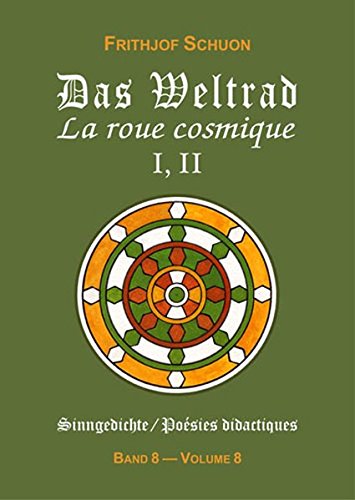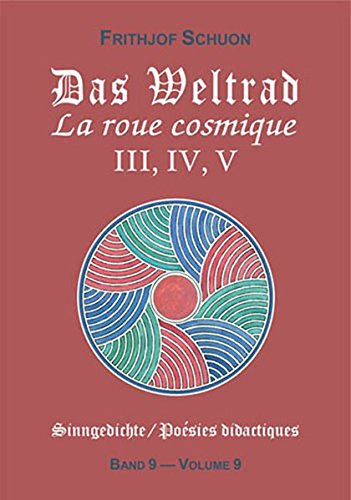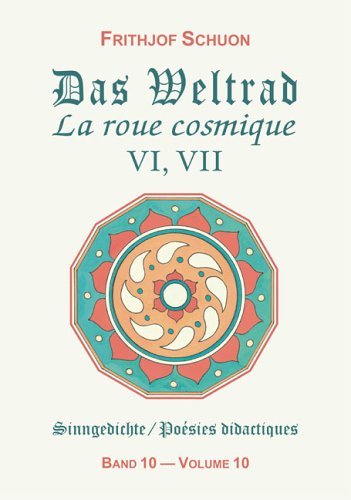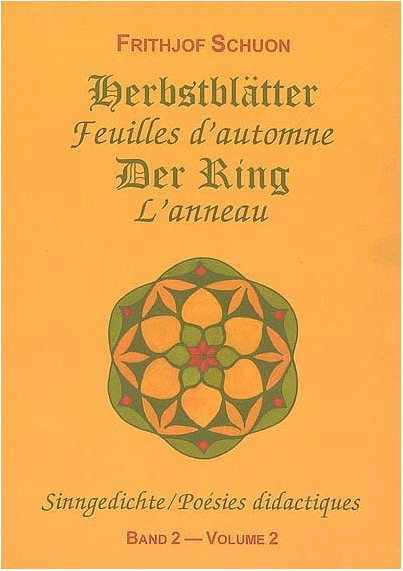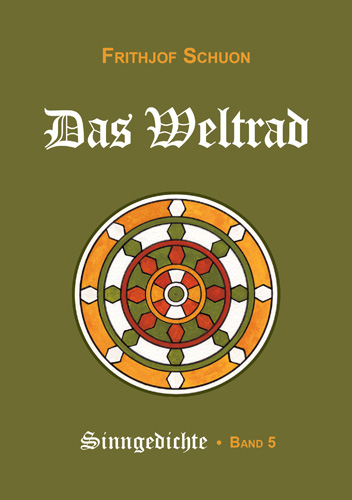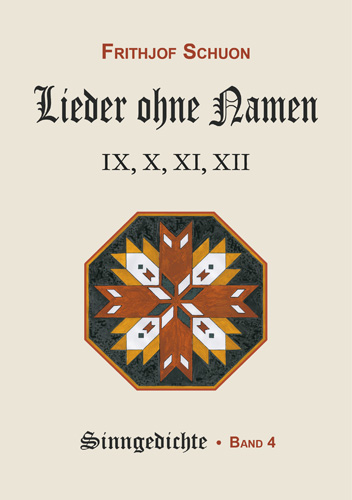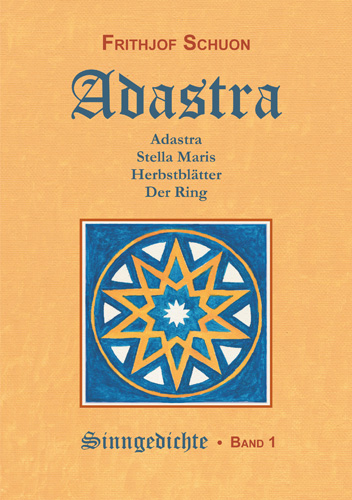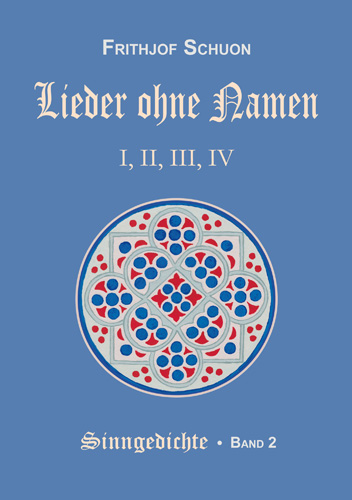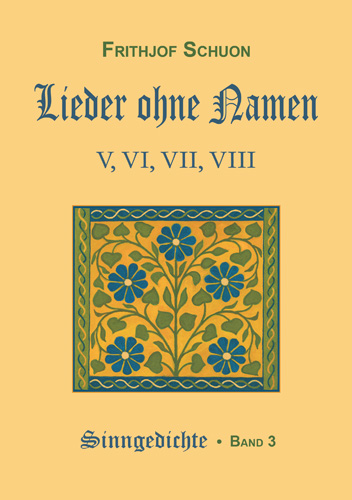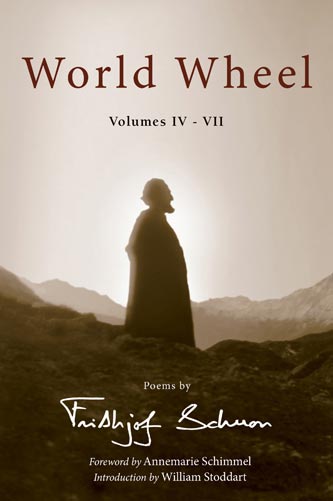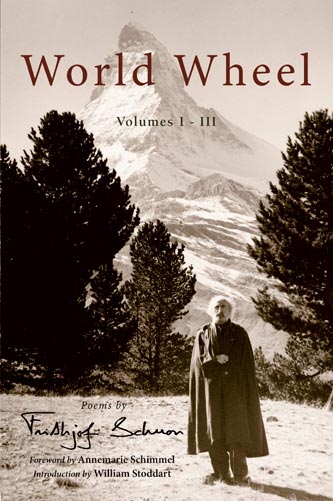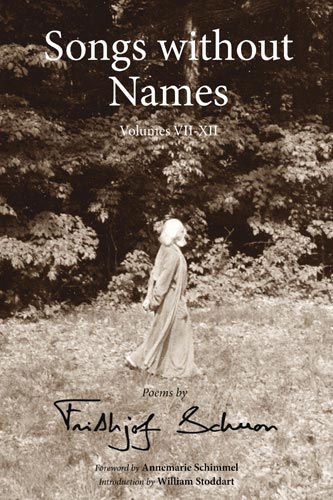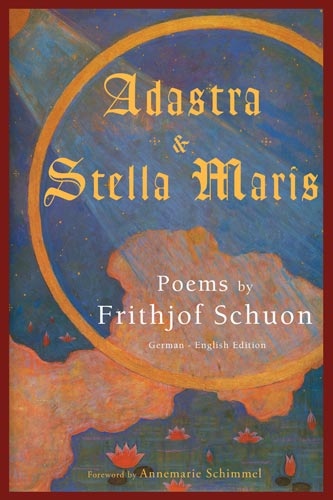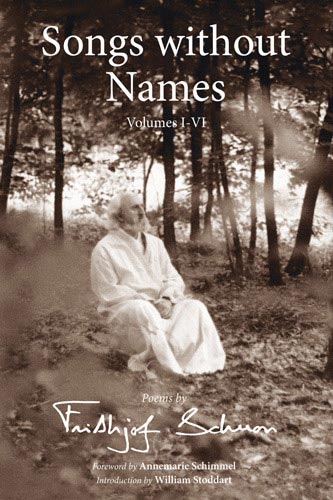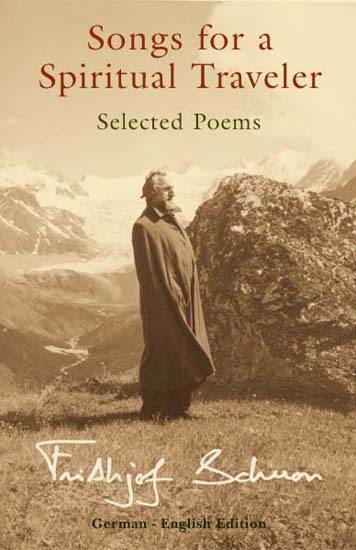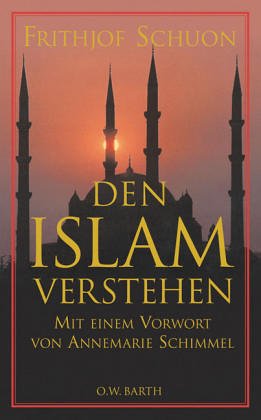
Frithjof Schuon Archive

Collections in Print
| Image | Title | Summary | Book Author | Book Subjects | Download | Price | hf:tax:book_subject | hf:tax:language |
|---|---|---|---|---|---|---|---|---|
| Das Weltrad 1, 2 | The German sense poems of Frithjof Schuon form a metaphysical and spiritual whole that unites the essential teachings of this master in a form that is both accessible and immediate. | Frithjof Schuon | Inspirational, Poetry | 35.84 | inspirational poetry | german | ||
| Das Weltrad 3, 4, 5 | The German sense poems of Frithjof Schuon form a metaphysical and spiritual whole that unites the essential teachings of this master in a form as accessible as it is immediate. | Frithjof Schuon | Inspirational, Poetry | 20.00 | inspirational poetry | german | ||
| Das Weltrad 6, 7 | As such, in their simplicity and directness, these poems may seem like a final mercy, a bit like a last lifeline thrown to us; mercy of a sage whose life and work can only be understood in the sign of giving, of conveying a core of certainty that is the key to happiness in this world and the next. | Frithjof Schuon | Inspirational, Poetry | 20.00 | inspirational poetry | german | ||
| Herbstblätter & Der Ring | The German sense poems of Frithjof Schuon form a metaphysical and spiritual whole that unites the essential teachings of this master in a form as accessible as it is immediate. | Frithjof Schuon | Inspirational, Poetry | 20.00 | inspirational poetry | french-2 german | ||
| Das Weltrad | The German sense poems of Frithjof Schuon form a metaphysical and spiritual whole that unites the essential teachings of this master in a form that is both accessible and immediate. | Frithjof Schuon | Inspirational, Poetry | 20.00 | inspirational poetry | german | ||
| Lieder ohne Namen IX-XII | The German sense poems of Frithjof Schuon form a metaphysical and spiritual whole that unites the essential teachings of this master in a form that is both accessible and immediate. | Frithjof Schuon | Inspirational, Poetry | 20.00 | inspirational poetry | german | ||
| Adastra | Frithjof Schuon’s German poems of meaning form a metaphysical and spiritual whole which unites the essential teachings of this Master in a form which is as accessible as it is immediate. | Frithjof Schuon | Inspirational, Poetry | 20.00 | inspirational poetry | german | ||
| Lieder ohne Namen I-IV | Frithjof Schuon’s German poems of meaning form a metaphysical and spiritual whole which unites the essential teachings of this Master in a form which is as accessible as it is immediate. | Frithjof Schuon | Inspirational, Poetry | 20.00 | inspirational poetry | german | ||
| Lieder ohne Namen V-VIII | Frithjof Schuon’s German poems of meaning form a metaphysical and spiritual whole which unites the essential teachings of this Master in a form which is as accessible as it is immediate. | Frithjof Schuon | Inspirational, Poetry | 20.00 | inspirational poetry | german | ||
| World Wheel: Poems by Frithjof Schuon Volumes IV-VII | A four-volume collection of spiritual poetry by Frithjof Schuon who wrote approximately 3,500 poems in his mother tongue German. | Frithhof Schuon | Inspirational, Metaphysics, Poetry | 22.00 | inspirational metaphysics poetry | english | ||
| World Wheel: Poems by Frithjof Schuon Volumes I-III | During the last three years of his life Frithjof Schuon wrote approximately 3,500 poems in his mother tongue German. | Frithjof Schuon | Inspirational, Metaphysics, Poetry | 22.00 | inspirational metaphysics poetry | english | ||
| Songs without Names: Poems by Frithjof Schuon Volumes VII-XII | During the last three years of his life Frithjof Schuon wrote approximately 3,500 poems in his mother tongue German. | Frithjof Schuon | Inspirational, Metaphysics, Poetry | 22.00 | inspirational metaphysics poetry | english | ||
| Adastra and Stella Maris: Poems by Frithjof Schuon | Adastra and Stella Maris: Poems by Frithjof Schuon represent the heart of Schuon’s German poems. These two books, combined in one volume, express, in the words of Annemarie Schimmel, “a mystery that lies beyond the normal human expression… | Frithjof Schuon | Inspirational, Metaphysics, Poetry | 19.95 | inspirational metaphysics poetry | english | ||
| Songs without Names: Poems by Frithjof Schuon Vol. I-VI | During the last three years of his life Frithjof Schuon wrote approximately 3,500 poems in his mother tongue German. | Frithjof Schuon | Inspirational, Metaphysics, Poetry | 22.00 | inspirational metaphysics poetry | english | ||
| Songs for a Spiritual Traveler: Selected Poems | The poetry of Frithjof Schuon has been called metaphysical music. English/German bilingual edition. | Frithjof Schuon | Inspirational, Metaphysics, Poetry | 13.95 | inspirational metaphysics poetry | english german |
Featured Books
Den Islam verstehen
This book by the great philosopher of religion Frithjof Schuon is considered worldwide as one of the best introductions to the true teachings of Islam.
Featured Poems
Adastra and Stella Maris: Poems by Frithjof Schuon-Contentment
To be content with God — these are weighty words.
Adastra and Stella Maris: Poems by Frithjof Schuon-Weekday
Weekday: noise, fleeing flood of humanity,
Adastra and Stella Maris: Poems by Frithjof Schuon-Upaya
There are two ways to draw you to the path
Featured Articles
The Introduction by Thomas Yellowtail to “The Feathered Sun” by Frithjof Schuon
Crow Sun Dance Chief and Medicine Man Thomas Yellowtail (1903-1993) wrote this introduction to Frithjof Schuon’s book “The Feathered Sun: Plains Indians in Art and Philosophy” to attest to the authenticity and truthfulness of Schuon’s writings and paintings found in this book. Yellowtail details his long relationship with Schuon and goes on to point out that Schuon captured the spirit of the olden-days Indians in both his paintings and his prose.
Book Review of “Dimensions of Islam”
Martin Lings reviews this book by Frithjof Schuon which is a complement to Understanding Islam and which explains in depth some of the problems that Christianity sees in Islam in the sanctity of the Prophet, for example, or the belittling of the human. Schuon explains that to be truly human and thus sanctified is to fit the divine mould which is Origin, Archetype, Norm and Goal. In Sufism this is expressed in a quaternary of divine Names: The First, the Last, the Outward and the Inward. Lings points out that these, “form the basis of this book, whose every chapter flows, as it were, along one or more of these dimensions.” Chapters under review include those on Jesus, Mary, the Archangels and the Five Divine Presences.
Foreword to “The Eye of the Heart”
Professor Huston Smith wrote the “Foreword” to the 1997 edition of Frithjof Schuon’s “The Eye of the Heart.” In it, Smith states unequivocally that he considers Schuon to be “the most important religious thinker of our century.” He explains this by pointing to Schuon’s solution to the thorniest issue facing those who believe in absolute Truth: Must there be only one valid Truth embodied in one religious tradition, thus excluding all others, or can there be another way in which absolute Truth can take on relative shadings, and still remain the Truth? Although Smith gives only brief attention to the specific contents of the book, he does summarize his thoughts with this: “Again in this book, as everywhere in Schuon’s writing, one is struck by the hierarchical, vertical character of his thinking — his depiction of an absolute and transcendent Reality that deploys itself through All-Possibility and ultimately returns to Itself through human beings ‘made in the image of God.'”
